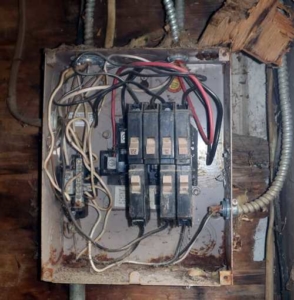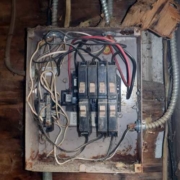“There’s absolutely nothing wrong with it!”
We often call out issues or defects during a home inspection that lead us to recommend evaluation and repair by licensed contractors. But sometimes that contractor shows up and tells the owner or buyer, “There’s absolutely nothing wrong with this. The home inspector was paranoid.”
Who’s right?
The short answer is, both of us might be wrong, and both of us might be right

Corroded Electrical Panel
Let’s take an example: a corroded electrical panel, like the one to the right. To a home inspector, corrosion means water, and water and electricity don’t play well together. We will call for repair or replacement of the panel. When the electrician shows up, they could very well look at the panel and say, “Yes, there’s corrosion, but it’s not that bad and I don’t think it needs to be replaced.”
Now what?
The best thing to do in this situation is to ask the contractor to declare in writing that the particular system does not have a defect and is safe to operate as is. This declaration should be on the company letterhead, complete with license number and full company information. If this is provided, then the responsibility and liability for the system is now the contractors. If they are not willing to provide a written declaration, you could probably take that to indicate they aren’t confident in its safe operation either.
How wrong is wrong?
There is also “okay” and “the way it should be.” Ground fault circuit interrupters (GFCIs) are a good example. They were not required in kitchens until 1987, but we always recommend them because they could save your life. We do see “time capsule” houses, with original kitchens and bathrooms, and the argument could be made that, since everything is original, and it was correct when built, we shouldn’t call out the lack of GFCIs as a defect. Swapping out a receptacle for a GFCI costs about $20; not having them where they could save someone’s life makes no sense, even if it is ‘okay.’
Get it in writing
There’s an old saying in the corporate world: “If it’s not in writing, it never happened.” Verbal assurances are worthless. Sometimes when confronted with a request to “please put that in writing on your letterhead for me,” contractors will backpedal and come back with, “Well…you know, the inspector is technically right; that probably should be fixed.”
If you do get the written assurance, it should go in your files along with other important house documents so you can show it to future buyers, or in case the issue in question does cause a problem down the road





Thanks for sharing this piece, really informative and helpful. I’d be using this for my upcoming post in biancoelectric.com. I really like the fact that you share the value and importance of our role as electrician helping every household be safe.
Really important tips and ideas that home owners can follow through for their electrical needs.